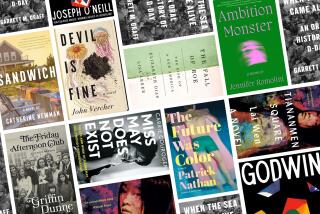Memoir and Medieval History From Sons of the Emerald Isle
- Share via
When an author rises from the ashes of obscurity and lands a Pulitzer Prize for his memoir, one wonders if he will pull off the same feat the second time around. Sorry, but Frank McCourt does not quite match the subtle emotional tugs of “Angela’s Ashes” with this volume of remembrance past. However, “ ‘Tis” does come close. (Simon & Schuster Audio; unabridged nonfiction; 10 cassettes; 14 hours; $49.95; read by the author. Also available abridged; four cassettes; six hours, $18; read by the author; CD versions also available.)
In this much-anticipated sequel to his account of his early life in Ireland, McCourt picks up the story in 1949, when he steps off the boat in America. Naivete, infected eyes, bad teeth, a thick brogue and a lack of education hinder the 19-year-old as he finds his way in the New World. His life is one of menial, poorly paying jobs, dreadful boarding houses and heavy drinking. He discovers an America in which racial stereotyping and a rabid ethnic pride try his patience in equal amounts.
Much criticism has been aimed at McCourt as a writer, depicting him as whiny and arrogant. Not so here. He simply describes the hatred and ignorance that were part of the poverty he endured. He also tells of his anger and disbelief at privileged people who complain of lives untouched by real hardship. He writes with literate lyricism of social class and behavior (or misbehavior) between the sexes. His tales of adversity and flawed individuals are painted with an understanding of human nature and a resigned, grim humor.
If there is to be any finger pointing, it is at the book’s editor, who should have corrected the autobiography’s overly loose structure. McCourt sometimes leaves us hanging. To wit: He never does tell us if his eyes were cured, though he spends a great deal of time describing their chronic infection. The author won an Audie Award from the Audio Publisher’s Assn. for his narration of “Angela’s Ashes.” Here, his verbal abilities are as finely honed as the last time he was in the studio. His humor is dark and dry, giving the narrative perspective. He enhances that humor by pausing just long enough to let irony sink in but refrains from coming across as embattled. There is a certain poetic rhythm to his reading, as he has a musical cadence derived from an Irish brogue that has been little softened by a lifetime in the States.
*
The Irish are everywhere on audio these days, from McCourt to fiction writer Roddy Doyle to memoirist Nuala O’Faolain. Thomas Cahill’s “How the Irish Saved Civilization” is one slice of Irish history that sold so well in an abridged audio format that it has recently been reissued in its entirety. (Bantam Doubleday Dell Audio; unabridged nonfiction; six cassettes; eight hours; $27.50; read by Donal Donnelly. Also available abridged; two cassettes; three hours, $18; read by Liam Neeson.)
For the most part, this is an intriguing, if prejudiced, account of the Irish monks who preserved great tracts of scholarship during the Dark Ages. Just be forewarned--the first two cassettes are deadly dull. Cahill provides a crash course in Western Civilization that is meant to put the rest of the book into a historical context, but just about puts the listener into a coma.
Stick with it. By the third cassette, Cahill lands in Ireland, and the pace improves considerably. He intersperses history with lively Celtic fiction and poetry. His story of St. Patrick is both surprising and fascinating, as the missionary first came to Ireland as a Roman youth abducted into slavery.
Though he weaves an intriguing tale of Irish scholarship, keep in mind that Cahill’s spin on history is wildly inconclusive. Let us not forget that much of Greek and Roman literature was also preserved in Constantinople. Cahill may engage us with his ideas, but he also exaggerates the importance of one island nation by disregarding other attempts at medieval preservation.
This is dense material, so the listener must pay attention. It was wise of the publisher to match this historical account with such a talented narrator as Irish actor Donal Donnelly. He changes his tone and pacing effortlessly for various characters in poems and folk tales. His slightly patrician manner befits the material. His cadence is soft and flowing, his manner energetic and light. Donnelly brings out the passion with which Cahill depicts the early Irish.
Rochelle O’Gorman reviews audio books every other week. Next week: Dick Lochte on mystery books.
For more reviews, read Book Review:
For more reviews, read Book Review
* This Sunday: Lou Cannon on “Dutch: A Memoir of Ronald Reagan” by Edmund Morris; Michael Lind on “A Republic, Not an Empire” by Patrick J. Buchanan; Jonathan Levi on Roddy Doyle’s new novel; Allen Barra on Philip Kimball’s “Liar’s Moon: A Long Story”
More to Read
Sign up for our Book Club newsletter
Get the latest news, events and more from the Los Angeles Times Book Club, and help us get L.A. reading and talking.
You may occasionally receive promotional content from the Los Angeles Times.










